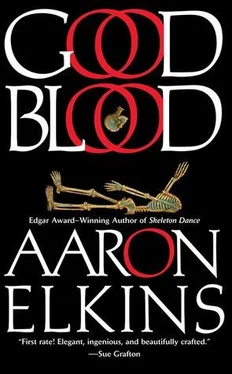Aaron Elkins - Good Blood
Здесь есть возможность читать онлайн «Aaron Elkins - Good Blood» весь текст электронной книги совершенно бесплатно (целиком полную версию без сокращений). В некоторых случаях можно слушать аудио, скачать через торрент в формате fb2 и присутствует краткое содержание. Жанр: Классический детектив, на английском языке. Описание произведения, (предисловие) а так же отзывы посетителей доступны на портале библиотеки ЛибКат.
- Название:Good Blood
- Автор:
- Жанр:
- Год:неизвестен
- ISBN:нет данных
- Рейтинг книги:3 / 5. Голосов: 1
-
Избранное:Добавить в избранное
- Отзывы:
-
Ваша оценка:
- 60
- 1
- 2
- 3
- 4
- 5
Good Blood: краткое содержание, описание и аннотация
Предлагаем к чтению аннотацию, описание, краткое содержание или предисловие (зависит от того, что написал сам автор книги «Good Blood»). Если вы не нашли необходимую информацию о книге — напишите в комментариях, мы постараемся отыскать её.
Good Blood — читать онлайн бесплатно полную книгу (весь текст) целиком
Ниже представлен текст книги, разбитый по страницам. Система сохранения места последней прочитанной страницы, позволяет с удобством читать онлайн бесплатно книгу «Good Blood», без необходимости каждый раз заново искать на чём Вы остановились. Поставьте закладку, и сможете в любой момент перейти на страницу, на которой закончили чтение.
Интервал:
Закладка:
No one referred to Vincenzo as “Count” nowadays, but his noble lineage still made some people weak in the knees, and his behind-the-scenes involvement in regional politics (useful in getting building permits and variances) had made him more widely influential than his father had ever been. None of that had any effect on Caravale. Less than nothing. To him, Vincenzo de Grazia was just another human being like him, only richer, and not one he was particularly fond of at that. His relentless terracing of the foothills of Caravale’s beloved Mount Zeda into “Residenze This” and “Ville That” had chewed at him for years. Who needed all those developments? Who could afford them? Not the people who lived and worked here, that was for sure.
Beyond that, these new walled, gated communities of de Grazia’s represented something else, something essentially un-Italian to his way of thinking. When Caravale had been growing up, the rich and the poor had lived together. People didn’t believe it now anymore, but it was true. Oh, there were great villas and humble cottages, but they’d existed side by side on the same streets and alleys, as they had for centuries, sharing the same neighborhood concerns. In Caprezzo, the best drinking water had come from a centuries-old stone fountain in the courtyard of the village’s wealthiest landowner, and every afternoon, as they had since Caravale’s grandmother had been a girl, and probably long before, the housewives and peasant women would come to fill their jugs and bottles, and to gossip, on essentially equal terms, with the family of the padrone. Or if not on equal terms, then at least one could say they understood and appreciated one another. How was that going to happen when all the rich had walled themselves off behind the locked gates of these new “California-style” communities? It wasn’t, and something that made Italy what it was was being lost.
All the same, de Grazia was a father, and the news that was about to descend on him was almost as dreadful as anything a father could hear. Caravale’s heart went out to him. Getting out of his car, he found himself thinking that it would be nice if there were someone else he could hand this task off to, the way Boldini had handed it off to him. But the comandante was right; it was Caravale who was going to be running the investigation, and the task properly fell to him.
De Grazia was not in the office, a pretty secretary, dark as a gypsy, told him, but at the site of the new golf course and residential community that the company had just begun to excavate. Did the colonel know where it was?
He did not.
“You can’t miss it,” he was told. “Take the road up Mount Zeda, and right after the turnoff to Caprezzo-you know Caprezzo?”
“That’s where I was born,” he said with a smile.
“Really?” She looked as if she didn’t know whether or not he was joking. “Well, right after the turnoff, before you get to the village, you’ll see an area where they’re clearing the trees-lots of bulldozers at work. You’ll find him there.”
“Right after the turnoff? Do you mean the big pasture below the village? He’s putting in a development there? Another development?”
She laughed. “Well, I don’t know what it was before, but it’s not a pasture anymore.”
Caravale’s heart was perhaps just a little less softened as he returned to his car.
THREE
The site was just where he’d feared it would be, on what had once been a wide ribbon of undulating meadow dotted with old flowering plum trees, which curved around the mountain’s flank. When he’d been a boy, it had been his playground. He and his friends had played soccer here and badgered the resident goats, pretending to be matadors-but now backhoes and bulldozers were shoving piles of rock and naked earth from one place to another. Already it was hard to remember the meadow as it had been.
GOLF AND COUNTRY CLUB LAKE MAGGIORE, the big, laser-embossed sign said in almost-English (which presumably gave it the trendy American tone that would attract rich Swiss and Milanese buyers), and underneath it a smaller, tacked-on placard for the benefit of the locals: Circolo Golf del Lago Maggiore. Una Realizzazione di Aurora Costruzioni.
Vincenzo de Grazia stood in consultation with another man, both wearing hard hats, work clothes, and work boots, and leaning over a blueprint spread out on the hood of a mud-caked cement truck. Truck, men, and everything else in sight were covered with dust. That was one thing you had to say about de Grazia: He didn’t run from getting dirt under his fingernails.
Caravale approached and waited for them to look up, but they remained immersed. “Signor de Grazia?” he said after a minute.
De Grazia glanced up, calculatedly leaving his forefinger resting on the diagram. “Yes, Colonel, can I do something for you?”
Caravale was impressed. It was natural enough that he himself should recognize de Grazia. He had seen him about often enough, and his picture was frequently in the newspaper; once there had even been a two-page spread on him in Oggi (“The Aristocrat of Waste-Water Treatment Plants”). Besides, de Grazia was quite striking-looking: a tight-knit, distinctively hawkfaced man with thick, stiff, ropy gray hair brushed straight back from the hairline, and a nose that cleaved the air like the prow of a ship. Add to that an air of bottled-up, restless energy and a rarely disguised impatience to get on with things, to move along, and he was not someone who would be easy to forget. Beyond that, once you watched him for a while, you couldn’t help but be aware of an ingrained sense of natural authority and entitlement that was hard to ignore, although it also tended to grate on the nerves. On Caravale’s nerves, anyway.
Colonel Caravale’s picture was occasionally in the papers or on local TV as well, but it was always in connection with some ceremonial affair or other, for which he’d be one of a crowd, and in dress uniform, complete with lavish gold braid and cocked hat with feather. Today he was wearing his workaday uniform, a simple, businesslike black with a white shirt and dark tie. And no one, to his knowledge, had ever called him “striking.” He was swarthy, short, fifteen pounds overweight, and heavy-featured, with beefy jowls that rode over his collars. Adolescent acne had left his cheeks deeply pitted. His thinning hair and receding hairline were more than made up for by the thick eyebrows that met in the middle of his forehead and even dipped a little, so that he had to shave the top of his nose every Sunday.
Once, dressing before a civic affair, stripped down to undershirt and shorts, he had taken a long look at his slope-shouldered, barrel-chested, short-legged figure in the mirror and shaken his head.
His wife, who had been unwrapping tissue paper from the ridiculous hat, had looked at him. “What’s the matter?”
“Ah, it’s hopeless,” he had said. “Look at me. Without my uniform, I look as if I should be slicing salami at the corner trattoria.”
She had shrugged and gone back to unpacking the hat. “With your uniform, you look as if you should be slicing salami at the corner trattoria.” Then, under her breath, with the slightest of smiles: “Or holding it up.”
That was as close as anybody had ever come to calling him “striking.” It was amazing that de Grazia, whom he’d never met, should recognize him.
“If you don’t mind,” Caravale said to him now. “I need to talk to you for a few minutes. Privately.”
“I’ll take care of this for you, Vincenzo,” the other man said promptly, rolling up the blueprint and snapping a rubber band over it. “We’ve caught it early enough. It shouldn’t be a problem.”
De Grazia grunted and turned to Caravale. “Yes, Colonel, is something the matter?”
Читать дальшеИнтервал:
Закладка:
Похожие книги на «Good Blood»
Представляем Вашему вниманию похожие книги на «Good Blood» списком для выбора. Мы отобрали схожую по названию и смыслу литературу в надежде предоставить читателям больше вариантов отыскать новые, интересные, ещё непрочитанные произведения.
Обсуждение, отзывы о книге «Good Blood» и просто собственные мнения читателей. Оставьте ваши комментарии, напишите, что Вы думаете о произведении, его смысле или главных героях. Укажите что конкретно понравилось, а что нет, и почему Вы так считаете.












